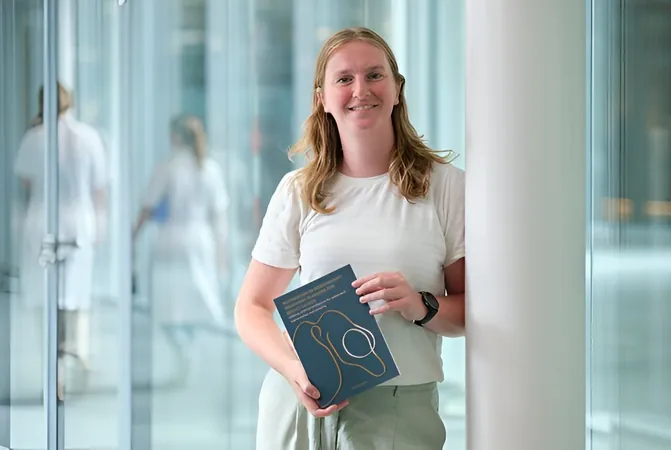
Transforming Breast Cancer Treatment: The Game-Changer of AI-Driven Plans
2024-09-26
Author: Jia
Introduction
In a groundbreaking advancement for breast cancer treatment, researchers have demonstrated that artificial intelligence (AI) can significantly streamline the creation of radiation therapy plans. By automating the drawing of patient-specific organs and tumors, this innovative approach is not just faster; it maintains the same level of reliability and precision essential for effective cancer treatment—a remarkable achievement given the current pressures faced by healthcare systems.
Research Overview
This transformative research, conducted by Nienke Bakx at the Catharina Hospital, was recently recognized as she earned her doctorate from Eindhoven University of Technology (TU/e) on September 19. Her work leverages newly developed AI models that automate the intricate process of mapping out individual breast cancer patients' anatomy, a task that previously relied on labor-intensive manual methods.
AI in Radiation Therapy
For years, the standard procedure involved technicians manually outlining a patient's anatomy based on imaging techniques, followed by the equally manual development of radiation treatment plans designed to obliterate cancer cells while sparing healthy tissue. Bakx emphasized the drastic time savings made possible by AI: “On average, we're saving about half an hour per patient,” she stated, highlighting a 40% reduction in time spent drawing tumors and an impressive 60% reduction for surrounding organs.
Efficiency and Verification
Since its pilot implementation in May 2022, this technology has undergone rigorous verification by radiotherapists and lab technicians to ensure safety and efficacy before final approval. Bakx noted that AI was able to create immediately usable radiation plans in 74% of cases, with that figure rising to 86% following minor adjustments. Such efficiency is crucial as the healthcare infrastructure faces unprecedented demands due to an aging population and rising cancer diagnoses.
Innovative Solutions
In her research, Bakx expressed a keen understanding of the pressing need for innovation within healthcare: “We’re seeing a scarcity of medical professionals due to vacancies that remain unfilled. Therefore, we must take action now; otherwise, the work pressure on existing staff will escalate uncontrollably.”
Broader Applications
The implications of Bakx’s research extend beyond just breast cancer. The success of these AI models has led to their application in other cancer types, such as esophageal and lung cancer, showcasing the versatility of this technology across various medical disciplines. Though these expansions were not part of Bakx’s initial research scope, they were made possible by her findings, illustrating the broad potential for AI in oncology.
Looking Ahead
Looking to the future, Bakx sees her work as not only a means to refine current medical practices but also as a sustainable solution to the ongoing challenges in healthcare. “We need more talented individuals to develop these models,” she explains, “but paradoxically, the long-term goal is to reduce the number of medical personnel required for certain tasks due to AI efficiency.”
Bakx's Journey
Bakx, who had always found the medical field intriguing but did not see herself in traditional roles, has successfully merged her passion for technology with healthcare innovations. Her collaboration with clinical physicist Coen Hurkmans, who recently became a professor, has been pivotal in this journey.
Conclusion
As Bakx wraps up her tenure at Catharina Hospital, she leaves behind a legacy of transformative research that is already reshaping cancer care. Colleague Niels van Acht will continue her work, focusing on how these AI models can be adapted sustainably as medical guidelines evolve, ensuring ongoing relevance in patient care.
This exciting intersection of technology and healthcare not only promises to enhance operational efficiency but also represents a significant leap towards a future where patients receive more timely and personalized treatments—truly a revolution in the battle against cancer.

 Brasil (PT)
Brasil (PT)
 Canada (EN)
Canada (EN)
 Chile (ES)
Chile (ES)
 España (ES)
España (ES)
 France (FR)
France (FR)
 Hong Kong (EN)
Hong Kong (EN)
 Italia (IT)
Italia (IT)
 日本 (JA)
日本 (JA)
 Magyarország (HU)
Magyarország (HU)
 Norge (NO)
Norge (NO)
 Polska (PL)
Polska (PL)
 Schweiz (DE)
Schweiz (DE)
 Singapore (EN)
Singapore (EN)
 Sverige (SV)
Sverige (SV)
 Suomi (FI)
Suomi (FI)
 Türkiye (TR)
Türkiye (TR)